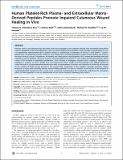Human Platelet-Rich Plasma- and Extracellular Matrix-Derived Peptides Promote Impaired Cutaneous Wound Healing In Vivo
Author(s)
Demidova-Rice, Tatiana N.; Wolf, Lindsey; Deckenback, Jeffry; Hamblin, Michael R.; Herman, Ira M.
DownloadDemidova-Rice-2012-Human platelet-rich.pdf (767.2Kb)
PUBLISHER_CC
Publisher with Creative Commons License
Creative Commons Attribution
Terms of use
Metadata
Show full item recordAbstract
Previous work in our laboratory has described several pro-angiogenic short peptides derived from endothelial extracellular matrices degraded by bacterial collagenase. Here we tested whether these peptides could stimulate wound healing in vivo. Our experiments demonstrated that a peptide created as combination of fragments of tenascin X and fibrillin 1 (comb1) applied into cranial dermal wounds created in mice treated with cyclophosphamide to impair wound healing, can improve the rate of wound closure. Furthermore, we identify and characterize a novel peptide (UN3) created and modified from two naturally-occurring peptides, which are present in human platelet-rich plasma. In vitro testing of UN3 demonstrates that it causes a 50% increase in endothelial proliferation, 250% increase in angiogenic response and a tripling of epithelial cell migration in response to injury. Results of in vivo experiments where comb1 and UN3 peptides were added together to cranial wounds in cyclophosphamide-treated mice leads to improvement of wound vascularization as shown by an increase of the number of blood vessels present in the wound beds. Application of the peptides markedly promotes cellular responses to injury and essentially restores wound healing dynamics to those of normal, acute wounds in the absence of cyclophosphamide impairment. Our current work is aimed at understanding the mechanisms underlying the stimulatory effects of these peptides as well as identification of the cellular receptors mediating these effects.
Date issued
2012-02Department
Harvard University--MIT Division of Health Sciences and TechnologyJournal
PLoS ONE
Publisher
Public Library of Science
Citation
Demidova-Rice, Tatiana N. et al. “Human Platelet-Rich Plasma- and Extracellular Matrix-Derived Peptides Promote Impaired Cutaneous Wound Healing In Vivo.” Ed. Paul McNeil. PLoS ONE 7.2 (2012): e32146. Web.
Version: Final published version
ISSN
1932-6203